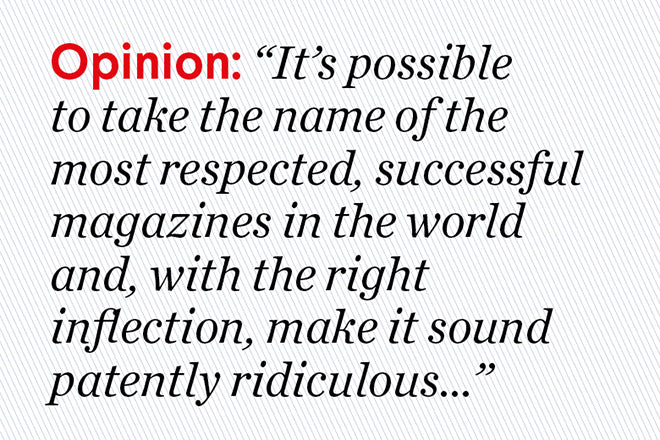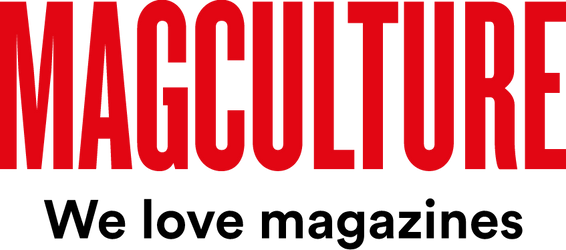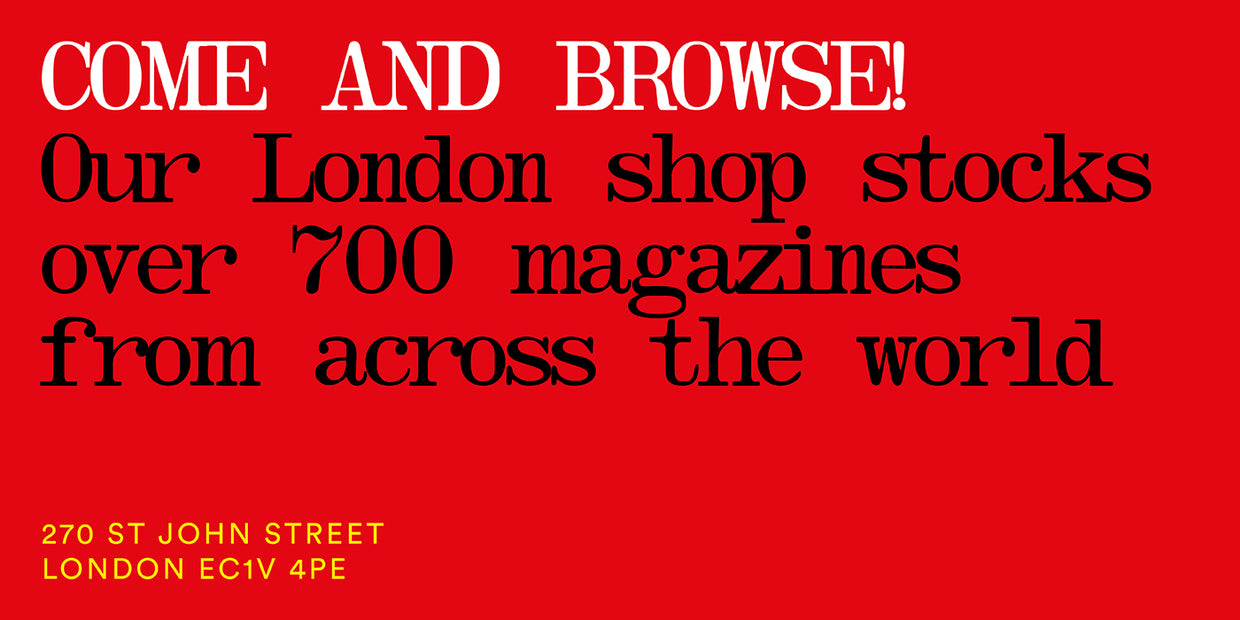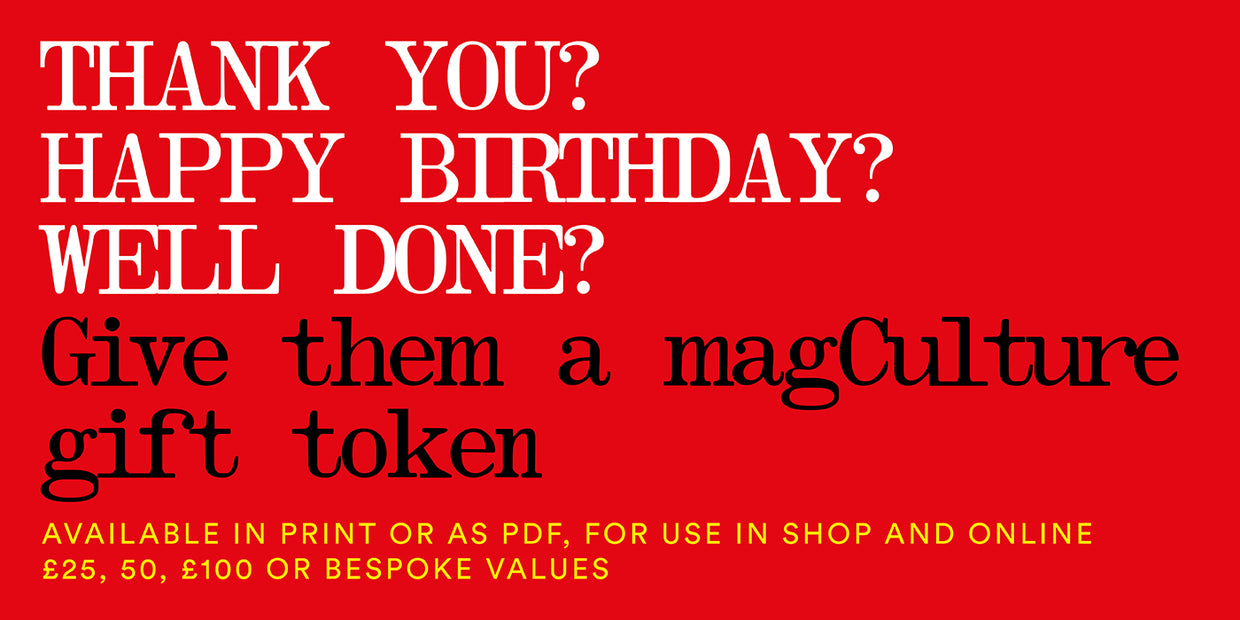
What’s in a name?
In his latest column Rob Alderson considers what magazine names mean when detached from their context.
In 2003, American writer Chuck Klosterman wrote a piece for Spin in which he watched music channel VH1 Classic for 24 consecutive hours. At one point he he realises that VH1 Classic runs a mirrored block of videos during its schedule, and he is going to have to sit through eight hours of music videos he has just watched already, in exactly the same order.
As Klosterman’s mind starts to wander, he muses on the movie ‘Flashdance’. “How did anyone pitching the script ever get past the segment of the description where he’d have to say, ‘Okay now here’s the key – this girl is also a professional welder’.”
Somehow for me this passage strikes to the heart of what it means to create something. The act can seem inherently ridiculous and, oftentimes, the more ridiculous it seems, the more brilliant the end result might be (for the record I am not holding up ‘Flashdance’ as an example of creative brilliance).
One of the greatest leaps of creative faith you can make is coming up with a good name, and the pressure on magazine-makers in this regard is as intense as any. The problem I think is that people have very immediate, very visceral reactions to suggested names for stuff. “How about ______?” The awkward silence. The wrinkled nose. The sideways head-tilt of the non-plussed. We’ve all seen it. We’ve probably done it.
It’s possible to take the name of the most respected, successful magazines in the world and, with the right inflection, make it sound patently ridiculous. “Ooooh I am a New Yorker. Pass me my magazine so I may read about myself.” “Are you Wired? I’m so fucking Wired. Let’s all take our shirts off, get together and read Wired.” See what I mean? And I think this happens all the time when people are trying to decide what to name their magazine.
It’s fair to say some of the names I now really, really like I didn’t like when I first heard them. And partly that’s because I was wrong and partly that’s because it’s crazy to imagine that, completely out of context, I’d like these names immediately. I am particularly drawn to titles that suggest the subject matter of the magazine but still make you work a little – Riposte, The Escapist, Avaunt, Flaneur, Lucky Peach, Weapons of Reason. But then I also the total enigmas – MacGuffin and American Chordata and Benji Knewman – and the pleasingly, confidently straightforward like Intern, Gratuitous Type, Fantastic Man.
The key, I think, is reasoning. Last year I interviewed the graphic design legend Bob Gill at his home in New York. He talked a lot about the importance of ideas when trying to convince someone else to do something. The example he gave in a design context was that if you go into a meeting and say it, “It should be blue” with nothing whatsoever to back that up, it is very easy for the other party just to say, “I don’t like blue.”
But if you go into that meeting and explain your core idea, the building blocks of your thinking and the reasons why logically, naturally it has to be blue, then you’re on much firmer footing.
I think the same is true when trying to name an entity like a magazine. If you present a name to your co-founders that came to you in a moment of divine inspiration and/or drunken wisdom – a name that just works even though you can’t really explain why – then it’s very easy for your colleagues to say that they don’t like it.
If though you can build up a reasoned narrative, built on why the magazine exists, what it’s trying to achieve and how it’s trying to achieve that, then it is odd for someone to say, “Yeah that doesn’t work for me.” If you can then add in design thinking around how this name could look and how it might be used, how it can adapt and evolve, how it can be memorable and consistent and flexible then you might just be onto something special.
As our maths teachers taught us, show your working.
That’s not to say of course lightning bolts of inspiration don’t happen and can’t work. I vividly remember sheets and sheets of names we wrote down when relaunching the It’s Nice That magazine – the clumsy and the cheesy and the forced and the pretentious and the reasonable and the insane and the nearly-there and the no-chance. And I remember getting a text one Sunday night from INT founder Will Hudson, which read, ‘Printed Pages.’
But even then we interrogated it as a name. Because even though it sounded good, and it looked good written down and it fitted with It’s Nice That’s pedigree of making simple names sound great and even though we could get a website for it and all those other things you consider at times like this, we still wanted to believe in it as a name, and, crucially be able to justify it to ourselves, then our colleagues and then the wider world.
Rob Alderson is managing editor of WeTransfer and a freelance arts and design writer.


